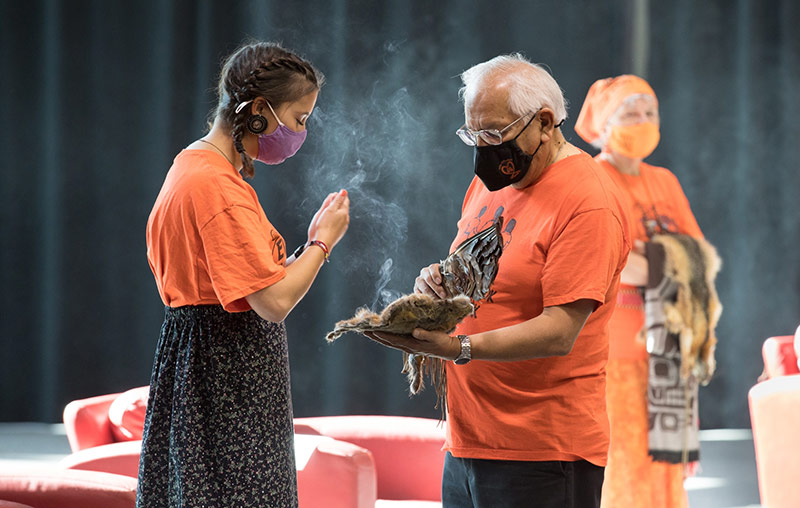UNB gathers to observe National Day for Truth and Reconciliation
Author: UNB Newsroom
Posted on Oct 7, 2021
Category: UNB Fredericton , UNB Saint John

On Thursday, Sept. 30, members of UNB’s community gathered to observe National Day for Truth and Reconciliation through a special event, Every Child Matters: Guiding Our Children Home.
The event, which was also livestreamed, was a joint initiative organized by members of UNB’s Mi'kmaq-Wolastoqey Centre and the Office of the President to meet the need for advancing the values of peace and friendship across the university and the wider community.
Canada’s first National Day for Truth and Reconciliation coincided with Orange Shirt Day, which honours survivors, their families and their communities. The significance of the orange shirts grew out of Phyllis' story, a survivor who was six when she had her orange shirt taken away from her the first day she was in Mission Residential School.
Elder David Perley emceed the two-hour event and Elder Imelda Perley provided an opening prayer and smudging. Elders, survivors and select members of the UNB community were invited to speak, and honour songs were also performed.
Organizers played a recorded tribute from two Wabanaki BEd students to the children of residential schools and UNB graduate student Diego Bear addressed the audience as he walked them through a demonstration of his newly created Wolastoqey language app. Attendees were also asked to write tributes on orange hearts, which were then placed on a dome made of birch.
In the days leading up to the event, orange shirts were distributed to various people across campus and members of the UNB community were encouraged to wear them on Sept. 29 and 30. Orange Truth and Reconciliation sidewalks were also installed on both campuses.
The Sept. 30 event provided an opportunity for members of the community to listen to survivors’ stories and reflect on what Truth, Reconciliation and justice means to them. Truth and Reconciliation is listed as a commitment in UNB’s strategic vision, UNB Toward 2030.
Dr. Paul J. Mazerolle, UNB’s president and vice-chancellor, spoke about the importance of the day and how it is a chance to reflect, share and learn about the legacy of survivors and the impact on families, children and communities.
“It is an opportunity, also, to acknowledge and recognize the history and legacy of residential schools and highlight the need for our community to commit to actions in support of Truth and Reconciliation,” he said.
“We need to never forget. We must acknowledge this history and we must have an authentic recollection and understanding. As educators, we must use our skills, our agency, to impart this history.”
“Words are not enough,” he added. “We must do more, and we need to put authenticity into our actions and use opportunities to build bridges of understanding.”
Media contact: Angie Deveau
Photo credit: Keith Minchin/UNB Media Services
